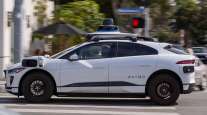Senior Reporter
Stakeholders Keep Pushing for Congressional Action on AVs

[Stay on top of transportation news: Get TTNews in your inbox.]
The absence of autonomous vehicles legislation before congressional committees has not discouraged industry stakeholders from continuing to insist lawmakers establish a set of federal policies for the technology.
The hope expressed by Ron Thaniel, vice president of legislative affairs at the Intelligent Transportation Society of America, is for Congress to eventually finalize the negotiations on bipartisan legislation.
ICYMI: @ITS_America's @RonThaniel and @UMichMcity's Heui Peng spoke at last week's #TheHillFutureofMobility? Watch the video of the panel here: https://t.co/ZQa6GAdlMS #THISisITS
— ITS America (@ITS_America) October 1, 2019
The bill would likely address concerns states and cities have raised regarding public roads, “but also, again, getting back to what has worked, and that is maintaining the federal authority over the design, construction and performance of the vehicles,” Thaniel said during a news forum Sept. 26.
“If we don’t have that structure in place, quite frankly, we are concerned that we are going to lose this technology,” Thaniel added. “In this environment, if there is a path forward with legislation, infrastructure could be that bill.”
At the same event, Huei Peng, Mcity director and Roger L. McCarthy professor of mechanical engineering at the University of Michigan, acknowledged the technology’s initial applications are likely to entail shared services, freight delivery and mobility on demand. As he put it, “The best use of this technology is to use where they can serve a purpose for the community.”
Just before members of Congress returned to Washington after their summer recess, nearly 50 groups wrote to the leadership of the transportation panels urging action on autonomous vehicles (AV) legislation.
They argued for a bill focusing on safety performance standards, access for the elderly and disabled, appropriate data sharing, local policy control and requisite resources for the National Highway Traffic Safety Administration.
“With these overarching recommendations, we can ensure AVs provide Americans with mobility options that are safe and convenient. Each of these groups will also share additional priorities and details beyond these shared recommendations as Congress considers AV legislation,” they wrote Aug. 23. “We look forward to working together with you to enact a federal regulatory structure to safely integrate AVs into our transportation system.”
Signatories included the National Association of City Transportation Officials, the National League of Cities and Transportation for America.
Transportation leaders have not indicated when legislation on guidelines for the deployment of autonomous vehicle technology would be unveiled. Aides from committees of jurisdiction recently told Transport Topics that autonomous policy guidelines could be included in comprehensive transportation legislation.
In the last session of Congress, Sens. John Thune (R-S.D.) and Gary Peters (D-Mich.) had co-sponsored legislation that would have established a policy framework for the technology. A floor vote was not scheduled in the Senate, despite the House passing its version. A final bill did not reach the president’s desk before the session’s adjournment.

Mcity test facility by University of Michigan
In September, Peters and colleagues from the Michigan delegation applauded a $7.5 million grant from the U.S. Department of Transportation for a statewide partnership designed to test and develop self-driving technologies.
“I was proud to help secure this federal grant that will support the groundbreaking work and collaboration taking place in Michigan that will transform the way we get around in the future,” said Peters, who sits on the freight-focused Commerce Committee. “This investment will help keep Michigan at the forefront of mobility, and ensure our state remains the global leader in developing self-driving innovations and building the vehicles of the future.”
“Michigan continues to pave the way for developing and testing safe autonomous vehicles,” added Sen. Debbie Stabenow (D-Mich.), a member of the tax-writing Finance Committee. “This is an important investment that will help Michigan continue its leadership on a global scale.”
Want more news? Listen to today's daily briefing:




